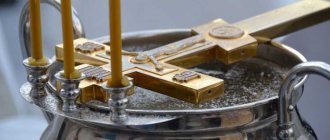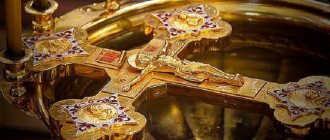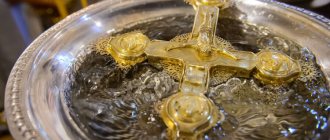You can bless water for Epiphany at home. A person who begins to pray for the consecration of water must be baptized, visit church, confess and receive Holy Communion. For consecration, you need to read a prayer, holding your hands in the water, and cross it three times.
On the feast of the Epiphany, water in churches is blessed twice. The day before, January 18, on Epiphany Eve, there was the rite of the great consecration of water, which is called the Great Hagiasma. And the second time - on the day of Epiphany, January 19, at the Divine Liturgy. But not everyone manages to go to church every year for Epiphany and collect holy water there.
holy water day
The ritual of imparting holiness and strength to water is performed on January 18 on Epiphany Eve and on January 19 on Epiphany. The shrine is also called the Great Agiasma. Other smaller-scale consecrations are also carried out throughout the year, but in such water there is no power equal to Epiphany.
The first water prayer service takes place on the morning of January 18 in the church. On the feast of Epiphany itself, it is customary to bless the living water of springs and rivers. A special ice hole (Jordan) is made in the pond and decorated with candlesticks, angels and an improvised iconostasis made of ice. The festive procession takes place accompanied by the singing of troparions and censing.
Epiphany water: scientific explanation
Many teachings are trying to give a scientific explanation for the phenomenon of Epiphany water. This riddle attracts world-famous professors and ordinary people.
Biophysicists deal with this issue in detail: they take water for analysis at different periods of time, analyze it under a microscope, and conduct chemical experiments.
As a result, a theory arose that explains the beneficial properties of water at Epiphany.
According to scientific conclusions, water acquires unique characteristics due to the fact that the Earth enters such a special position when there is a strong flow of particles that change the properties of water. Scientists can even name specific hours when this happens: January 18 from 17:30 to 23:30 and January 19 from 12:30 to 16:00.
It was possible to determine the time so accurately thanks to the annual observation of this process by scientists. After the specified period, the water quickly returns to its normal state.
Scientists have also found that water is highly susceptible to current conductivity. At certain times its molecules are very active, and at others they are quiet. All this affects the structure of water and its properties subsequently.
The physical explanation of the phenomenon of Epiphany water looks like this:
- The earth's shells fluctuate horizontally and vertically.
- Under the influence of the Sun, the shells begin to move, and tidal friction begins.
- Electromagnetic radiation is emitted into water resources throughout the planet.
A person also feels these changes: at some hours he may be cheerful and cheerful, and at others he may be lethargic and depressed.
The period of Epiphany holidays marks a new phase of the solar cycle. This means that the vibrations will be active, which will immediately affect the structure of the water. The molecules will also be active and affect the human body in a similar way.
Scientists also give the following explanation for the fact that Epiphany water does not spoil for a long time: due to low electrical conductivity, the growth of microorganisms in the liquid slows down, which means that the water will remain in its original form for a long time.
Why is water holy?
The tradition of blessing water is quite ancient, but it has fully survived to this day. There is an opinion that a silver cross immersed in it gives holiness to water, but this is not entirely true. She receives miraculous power thanks to the special blessing of God. Agiasma is the keeper of the heavenly gift and an inexhaustible reservoir of Divine power. The reading of a prayer by the priest and the immersion of the cross fills ordinary water with God's grace. After which she herself becomes a shrine, with which people and objects are sprinkled.
How and when is water blessed in church?
The ritual of blessing water in churches is carried out throughout the year, so you can collect Epiphany water as needed.
The clergy adheres to three ranks:
- Giving holiness during the sacrament of baptism;
- Great consecrations on Vespers and the Feast of Epiphany;
- The minor rite is carried out during temple holidays and when needed.
The power of Epiphany water is the same in all cases; it is considered a sin to compare its capabilities.
The main rite begins with a service behind the pulpit, after which the clergy and the parishioners head to the water while singing chants (stichera). The censing and general prayer for the endowment of water with the “blessing of the Jordan” and “healing of mental and physical infirmities” ends with the immersion of the cross in the ice hole and the sprinkling of the people with Saint Agiasma.
There is an opinion that immersion in the Jordan washes away sins, but it is not justified and is not considered mandatory. Only repentance and prayer can cleanse the human soul and thoughts.
Orthodox Life
Sermon by the rector of the Kyiv Theological Academy and Seminary, Bishop Sylvester of Belogorodsk, on the feast of the Epiphany.
In the name of the Father and the Son and the Holy Spirit!
Dear brothers and sisters! Today we have gathered to perform the rite of the Great Blessing of Water. There is a small consecration of water and there is a Great consecration, which takes place during the feast of the Epiphany. Where did the rite of blessing water come from in the Church and what is the meaning behind it? What significance does this have in the life of Orthodox Christians?
If you listen to the liturgical texts related to the blessing of water, you will notice that this sacred rite correlates with two very important events. The first of them is, naturally, the Baptism of the Lord God and our Savior Jesus Christ, while the second takes us much earlier - to the very beginning of the existence of the Universe. The Holy Scriptures say that at the creation of the world, “the Spirit of God was hovering over the waters” (Gen. 1:2). Water is a symbol of life; in a sense, it is the primary element of the world. And if the incarnation, suffering, death and Resurrection of the Lord brought about the renewal of this world, then, of course, water, as the main element of the world, also undergoes renewal and sanctification. The consecration of the “water nature” occurred precisely at the moment of the Baptism of the Savior on the Jordan River. Thanks to Christ’s descent into the waters of the Jordan, the water element acquires a new purpose: from now on it not only cleanses physical filth, but becomes a substance that serves to perform the sacrament of our baptism (cf. Mark 1:8). Thus, water, as the main vital element of the created cosmos in the Old Testament, becomes the source of rebirth and renewal of authentic life in the New Testament.
In one of today’s prayers for the consecration of water, we heard the following words: Christ comes to be baptized in the Jordan in order to “crush the heads of the serpents nesting there.” What do these words mean? By the image of “serpents nesting in water” we understand, first of all, the susceptibility of material nature to decay, as a result of the fall of our ancestors. Despite the fact that only man sinned, the consequences are borne by the entire created world: “Cursed is the earth for your sake” (Gen. 3:17). And the holy Apostle Paul writes about it this way: “The creation was subjected to vanity, not voluntarily, but by the will of the one who subjected it, in the hope that the creation itself would be freed from the slavery of corruption into the freedom of the glory of the children of God. For we know that the whole creation groans and suffers together until now” (Rom. 8:20-22).
So, as we see, through the sin of our ancestors, all created nature, including the water element, was damaged and subject to corruption.
The baptism of John was performed for the forgiveness of sins (Matthew 3:13-15; Mark 1:4; Luke 3:3), but Christ, as a sinless one, did not need baptism, but accepted it in order to renew the watery nature and return the water to its original properties. In addition, the Baptism of the Lord is the “fulfillment of righteousness,” the realization of Divine Providence aimed at the salvation of the world. Thus, Baptism is also the beginning of Christ’s preaching about the coming of the Kingdom of God, which has come in power. So, from now on, water is no longer a reflection of fear and the abyss; it no longer signifies formlessness, disorder, chaos and death. From the moment of the Baptism of the Lord in the Jordan, water again becomes a symbol of life. Therefore, the words from the consecration of water about “crushing the heads of serpents” are evidence that the touch of Christ to any of the elements, to all nature, sanctifies them and renews them with grace-filled powers.
Every time we bless water, especially on the eve or the feast of Epiphany itself, we relate ourselves to that great event that took place on the Jordan River. On these holidays, we especially thank the Lord that a renewed world is returning to us.
It should be noted that the prayers following the Great Blessing of Water coincide with some prayers from the sacrament of Baptism. The meaning of the latter is that a person entering the waters of Baptism dies to sin, as if buried in the waters of baptism, in order to be resurrected renewed in Christ. In the waters of Baptism, the old man, living according to the law of sin, dies, and the new man comes to life, renewed in the image of the Lord Jesus Christ (cf. 1 Pet. 3:21; Col. 3:10). Therefore, the meaning of the sacrament of Baptism is to die to sin and come to life to God. This is also spoken of in today’s apostolic reading, where, in particular, a parallel is drawn: immersion in water is an image of death, leaving water is a symbol of birth.
Prayerfully honoring the Baptism of the Lord, we will always remember that in Christ the whole world and each of its elements have already been renewed, and water, as the primary element, is no longer a symbol of death, the abyss and disorder, but again becomes a symbol of life. And therefore, the tradition on the day of the Great Blessing of Water to sprinkle everything that is around us and has a certain value for us: housing, food and the like - is an expression of our hope that water, like an element that penetrates everywhere and permeates everything, will sanctify these objects, will snatch them from the power of unclean spirits and drive out the power of the Fall. Saint Cyril of Jerusalem says: “since the head of the dragon had to be crushed, He went down into the waters and bound the strong man, so that we would receive from Him the power to tread on serpents and scorpions.”
Brothers and sisters! Nowadays, taking a dip in water sources during these festive days has become extremely common. There are both ardent opponents and supporters of this practice. How to answer questions and bewilderments about this? First of all, of course, let us recall that such a practice is not reflected in any way in the liturgical charter of the Church. However, leaving it up to everyone to act according to their faith and understanding, let’s say that anyone who wants to plunge into these holidays should not see the meaning and significance of the Feast of Epiphany in this! If for some person the main thing on the day of Epiphany is to plunge into the ice hole, but not to be at the festive service, not to pray at the sacred rite of the Great Blessing of Water, then, of course, he is doing wrong. And even more - such a person follows a dangerous path, paganizing, that is, turning into paganism, this great sacrament of the Epiphany of our Lord Jesus Christ. And such a disrespectful and irreverent attitude is nothing more than “folly, a dark invention of demons and the product of a pitiful mind,” as St. Gregory the Theologian. However, if a person, with reverence and awe befitting a great holiday, prayed during the divine service, was a participant in consecrating sacred rites, and then, either by force of habit or established custom, decides to take part in dipping, then he can do so, but with preservation behavior that befits an Orthodox Christian.
Let us realize again and again that today’s holiday is a day of enlightenment, a day of Light, a day of God’s mercy to us. And, like on all other church holidays, this day should become for us a time of meeting with God, and thanking Him for His mercies to us. Amen!
Where to get holy water
You should not pour water into large canisters on Epiphany, making a supply for the whole year. At any time you can take it in the temple or add a few drops of Saint Agiasma to ordinary water. The power of water lies not in its structure and energy, but in prayer and blessing. In addition to Baptism, water is blessed on other temple holidays and when necessary. For the ritual, take clean containers, preferably glass, as well as spring water.
Isaiah's prophecies reading: [Chapter 55.]
This is what the Lord says: if you are thirsty, go to the water, and do not have any money, but go and buy and eat and drink, without money or price, wine and fat. How much do you value silver, not for bread, and your labor not for satiety? Listen to Me, and you will receive good things, and your soul will delight in good things. Give ear to your ears and follow My path: you will hear Me, and your soul will live in good things. And I bequeath to you an everlasting covenant, faithful Saint of David. This is a testimony among the nations, His prince and ruler among the nations. Behold, the pagans who do not know you will call on you, and the people who do not know you will run to you for the sake of your Lord and the Holy One of Israel, for they have glorified you. Seek God, and when you find Him, call upon him. Whenever it comes near to you, let the wicked forsake his ways, and the wicked man his counsel: and turn to the Lord your God, and you will have mercy, for your sins will be forgiven in abundance. For My counsels are not as your counsels are: lower than your ways are My ways, saith the Lord. But just as the heavens are separated from the earth, so is My way separated from your ways, and your thoughts from My thoughts. For if rain or snow falls from heaven, and does not return from there, it will make the earth drunken, and give birth and vegetate, and give seed to the sower, and bread for food: So shall my word be, if he go out of my mouth, and shall not return? I will come to Me, until all I have desired, and I will hasten My ways and My commandments. For you will go forth with joy, and you will learn with joy: the mountains and hills will rush over waiting for you in joy, and all the trees of the village will be entwined with branches. And instead of dracia, a cypress will come up, and instead of a crop, myrrh will come up. And the Lord will be for a name and for an everlasting sign, and will not fail.
Where to store holy water
No one will dispute that holy water is a real shrine, but it must be stored and used wisely. A glass or ceramic vessel with liquid is kept next to icons and other consecrated objects. It is forbidden to place it in a refrigerator or cupboard with food and cereals, or keep it in the sun. Mustiness and yellowness of water can be caused by a difficult situation in the home, frequent quarrels, fights and adultery. It is advisable to remove any label on a plastic or glass bottle.
The main thing to remember is that water should not stand idle; it is drunk after morning prayer.
Voice 1
In the Jordan, I was baptized to You, Lord, Trinitarian adoration appeared: For the voice of your parents testified to You, calling Your beloved Son: and the Spirit in the form of a dove, the affirmation known to your words, appeared, Christ our God, and the world of enlightenment, glory to You.
After this, while the troparion is repeatedly sung by the singers, the abbot with the Cross in his left hand sprinkles a cross in all directions, and also sprinkles the temple with holy water. After sprinkling, it is necessary to sing the stichera for Glory, and now: Let us sing, O faithful ones.
How to use holy water
Blessed water is used for good and various needs: they sprinkle the home and its inhabitants for healing and expelling evil spirits. After reading the morning prayer, a person must take a sip of the great Agiasma on an empty stomach, and on Epiphany they drink it throughout the day. To heal an illness, people drink water often, but not more than 0.5 glasses at a time, and even take medications with it. In times of grief and depression, they are also saved by water and prayer. They wash themselves with it and sprinkle it on their loved ones.
The shrine is treated with reverence. If a vessel is broken or water is spilled, collect it with a cloth and squeeze out the moisture into another container or into a flower pot. Water with glass fragments is poured into the river, but under no circumstances is it sent to the sewer.
Epiphany water: history
The history of Epiphany water begins with the advent of the feast of Epiphany and the very fact of baptism in the Jordan River. This happened 2 thousand years ago. History says that at that time Jews came to John the Baptist to be baptized. Thus, they wanted to wash away all their sins. But John did not agree to baptize everyone. According to him, first he had to confess and admit all his sins.
One day Jesus Christ came to be baptized. But John the Baptist did not accept it at first and only after a while gave his consent to the ritual.
Why was Jesus, who had no sins, baptized? Unlike people, he did this to take upon himself their sins. By his example, he showed that a believer cannot help but perform this ritual. Only in this way will he receive a blessing from the Lord, he will have a chance to atone for his sins, overcome fear, pain and torment for the sake of supreme grace.
The power of holy water
Holy water heals by God's will and there is no magic in it. Without faith and prayer, its strength is lost. True faith in Christ, in his power, worship and righteous life - these qualities direct a person to the true path. The powerful energy of Epiphany water is being studied by many scientists. Some are inclined to believe that water absorbs information, emotions of goodness and prayers, others are of the opinion that the disinfecting property of silver prevents it from disappearing and helps to heal, and still others are supporters of charging water from space, because it is on January 19 that the Earth goes through special irradiation. There was a recorded case when a dying man was given Epiphany water to drink and he began to recover. Or another case with a woman who brought fortune telling cards in an Easter basket to the temple for sprinkling. In those places where drops of water fell, burnt spots formed on the cards.
Proverbs
Thus says the Lord: let the thirsty desert rejoice, let the desert rejoice, and flourish like a tree, and let it vegetate, and let everyone rejoice. And the desert Jordan will rejoice, and the glory of Lebanon will be given to it, and the honor of Carmel, and My people will see the glory of the Lord and the height of God. Strengthen your weak hands, and comfort your weak knees. And cry out to the faint-hearted, be strong and do not be afraid: behold, our God rewards judgment, He will come and save us. Then the eyes of the blind will be opened, and the ears of the deaf will be heard: Then the lame will leap like a tree, and the tongue of the deaf will be clear: as water has burst forth in the desert, and the wilds in a thirsty land. And there will be a waterless land in the blata, and in the thirsty land there will be a source of water: there will be the joy of the birds, the installation of sirens, and reeds, and blata. There the path will be pure, and the path will be called holy; and the unclean one will not pass by; below there will be the unclean path; but those who are scattered will walk along it and will not go astray. And there will be no lion there, lower than the fierce beasts the nan will rise, lower there will be found there: but they will follow it, delivered and gathered from the Lord. And they will be converted and come to Zion with gladness and joy, and everlasting joy will be upon their heads. Praise and joy and joy will befall them; sickness, sorrow and sighing will escape.
Holy water from the evil eye
Jealousy and envy often become the cause of the evil eye. Negative energy affects another person and causes harm to him, bringing illness and anxiety. Holy water has long been considered and today is considered the most effective protection against any negativity. Great and small Agiasma are suitable for removing the evil eye. Having sprinkled it on the patient, they allow the sufferer to take a few sips. If there is strong negativity, they do a ritual with a bath. To do this, fill the vessel halfway with warm water and pour in holy water crosswise. They sit in the bathroom and read “Our Father.” With this ritual, not only does the evil eye disappear, but also bruises and rashes disappear.
Does Epiphany water spoil?
Considering the unique properties of Epiphany water, it is rational to find out whether such a liquid spoils. It happens that such a liquid, to the surprise of Christian believers, “blooms” and acquires an unpleasant smell and taste. In this case, the main thing is not to panic and not take it as a sign from above. It’s just that plant seeds can get into the water, then this result is a simple pattern.
Also, water can stand in the sun for a long time and also become undrinkable. In such a situation, there is no need to pour it down the drain.
If sediment is found in the water, this is another sign of spoiled liquid. So it’s time to water the flowers with this water and not worry about using it for other purposes.
How to consecrate an apartment with holy water
Sprinkling of things and homes is carried out to fill them with God's grace, as well as to drive out an unclean spirit. In such rooms, Christ is close to family members. Before the ritual, the home is put in order. The windows are not covered with curtains, the vents are opened slightly so that the light penetrates into the rooms as much as possible. On Sunday they go to the temple for a blessing; you can perform the ritual without it. They wash their hands, pour water into a deep plate, read a prayer and walk around the room clockwise with the chips of their right hand. They finish and begin the consecration at the front door. Sprinkling is carried out by saying the words:
At the end of the ceremony, a vessel with water is placed next to the icons.
Old holy water what to do with it
The remaining supply of old water, which has been stored for several years, can be poured into a place where people do not go: into a river or stream. It will not be disrespectful to the shrine if you pour water on an indoor flower or tree. Inappropriate inscriptions on vessels with water, for example, “Vodka,” can cause it to become musty and green.
It is forbidden to pour the sacred thing into the sink for sewage - this is a “crime” before the Almighty.
Is it possible to drink Epiphany water?
Before beginning the process of consecration, inexperienced parishioners are interested in whether it is possible to drink baptismal water and give it to children. The answer is clear - it is possible and even necessary. This water has unique healing properties, will help improve health, protect against bad looks, and improve energy metabolism.
Children should be given Epiphany water to drink regularly. This can be done from birth. Over time, this ritual will become a habit and the child will be protected and respectful of the faith.
Holy water spell:
The importance of water is invaluable. It not only supports vitality, but is also capable of healing a person, making him unhappy or rich. Over time, people learned to perform various rituals with water.
for love
The conspiracy is carried out on the waxing moon. As it fills, the feeling of being chosen will grow. They read the plot in front of a glass of water, which is tied with a red ribbon, near a photo of their loved one. The words are pronounced three times, they cross themselves and place water near the icon. The woman first drinks the charmed water and then pours it on the man.
A prerequisite is that the chosen one must be in a good mood.
from drunkenness
The conspiracy against drunkenness is read over a jar with an airtight lid. At the beginning of the ritual, they remove it, place water in front of the icon and, bending low towards the jar, whisper the words of the conspiracy. They read the prayer three times, cross themselves and close the jar. The vessel is opened only to add the charmed water to the drunkard.
for trade
To increase trade turnover and attract buyers, the conspiracy is carried out in the workplace. Holy water is poured into a clean glass, a coin is placed in it and a prayer is read. Then they take the charmed water into their mouth and spray the workplace. The remainder is poured out near the counter, and the coin is sent to the left pocket to remove the negative.
Remember, holy water is powerless if a person lives without God in his soul. Follow his commandments, love God and your neighbors, participate in Christian sacraments in churches and perform prayers at home.
Epiphany water: prayer
Epiphany water will become stronger if you use it together with reading a prayer. Both believers and scientists agree with this. The former will confirm that any ritual in Christianity is impossible without prayer, and the latter have established that when reading a prayer, the frequency of vibrations is equal to the purity of the Earth’s vibrations. This makes the water structure correct and it acquires beneficial properties.
Prayers for Epiphany water can be divided into two types:
- for lighting an apartment and other premises;
- for taking water inside.
If you need to protect your home, pour Epiphany water into a small container and pick up a candle. You can also attach a cross to the container if possible. Next you should say a prayer:
Leave the water untouched all night, and in the morning walk through the rooms and sprinkle it in the corners. You can also wash your household with it.
If the water is intended for ingestion, then the following prayer should be read:
There are several rules on how to drink holy water correctly:
- Pour the liquid into a separate container.
- Drink on an empty stomach in the morning or before bed.
- You can use it any number of times a day, in any volume.
- After a person has drunk the water, a prayer for healing must be read.
- A compress soaked in holy water will help relieve pain.
- It is important not to pour out the baptismal water and not to spill a single drop.
If a person has forgotten the prayers listed above, then you can simply read “Our Father.”











